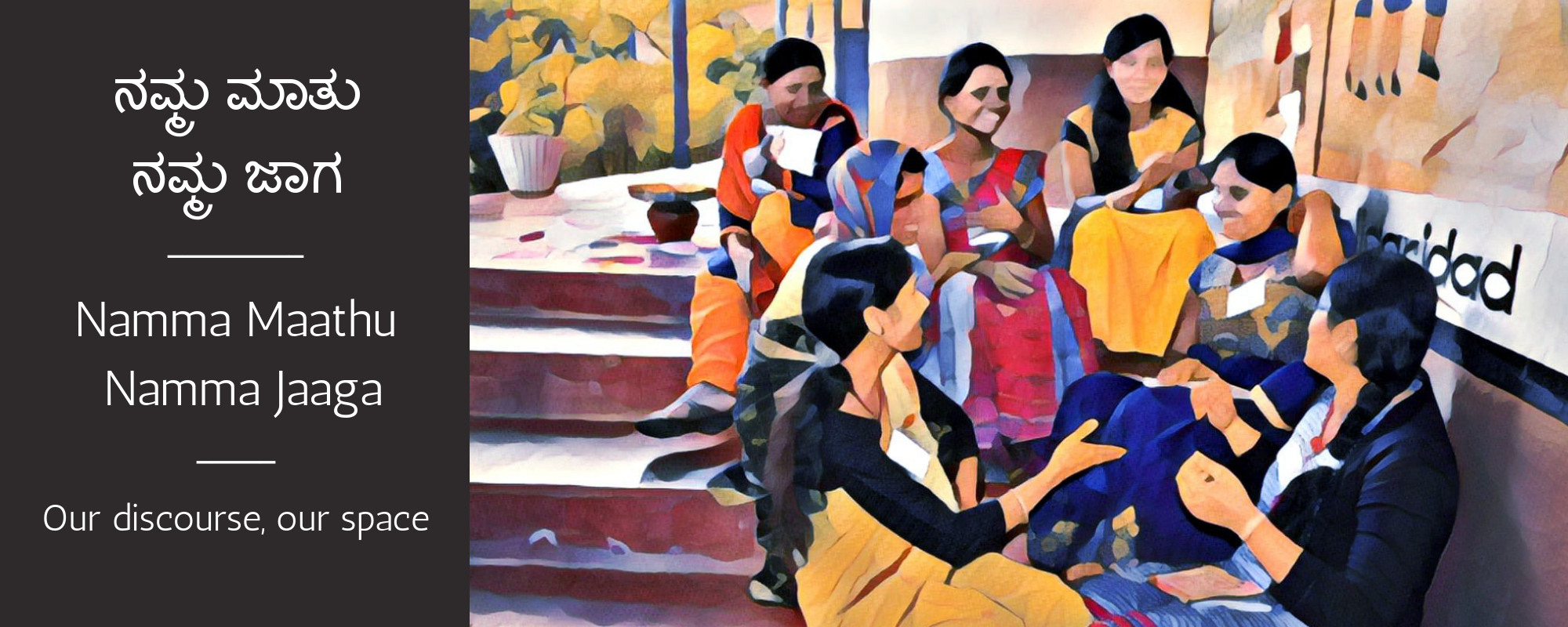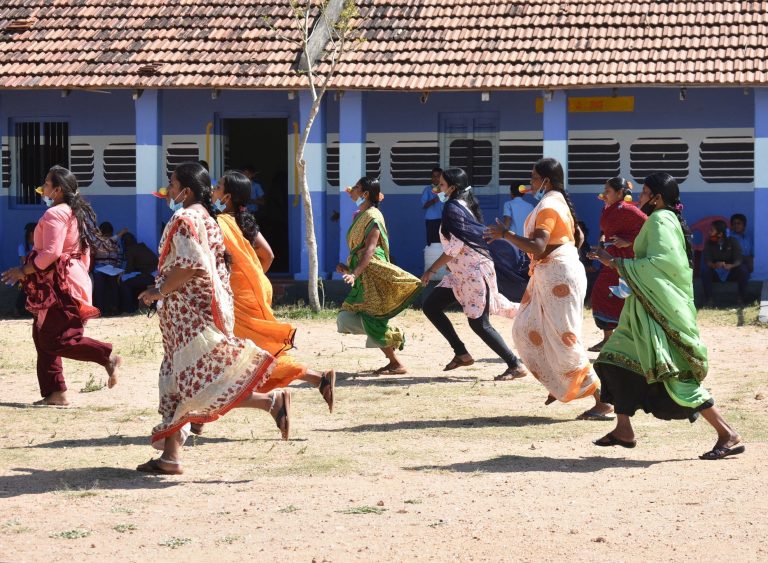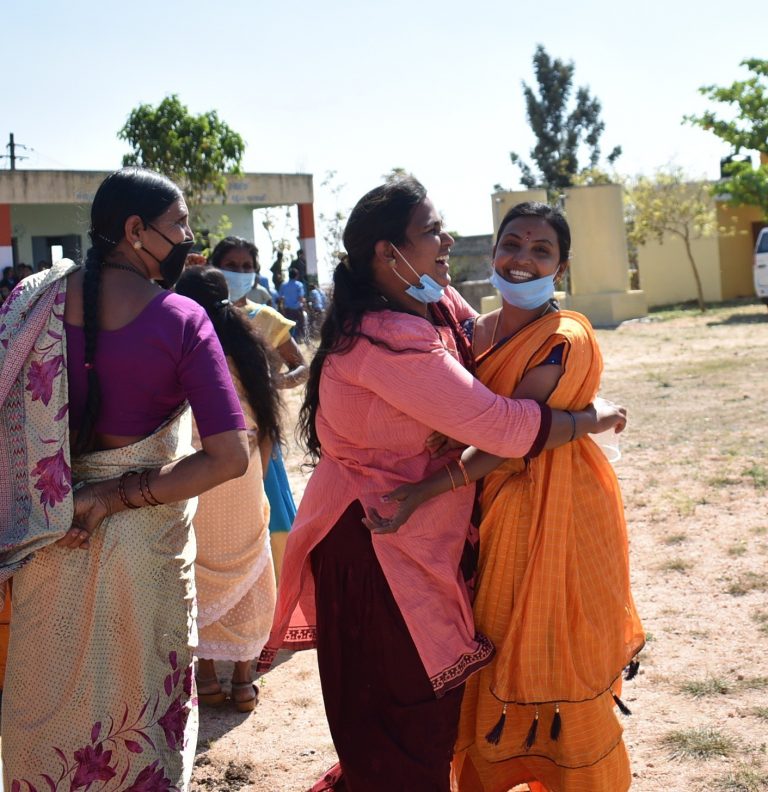
Breaking Social Barriers and Claiming Public Spaces
Nayana Kirasur | May 2021

Prakriye organized Sports Day for women in the month of March to celebrate International Women’s Day, 2021. 560 women from 55 villages of the HD Kote and Hunsur blocks of Mysuru, Karnataka, participated in games such as lemon and spoon race and tug-of-war at village and school playgrounds. They also engaged with films that shed light on the history and significance of International Women’s Day.
The patriarchal social order discourages women from playing sports, especially in public spaces. How did the women overcome these confines and occupy spaces that are rarely accessible to them?
Ratnamma’s day starts at 5 a.m. She sweeps the house, cooks, and then goes to work at 7:30 a.m. As a farm laborer, she clears weeds, harvests ginger and picks cotton. “What I do keeps changing. The kind of work I do depends on the season,” she shares. “I come back home at 5:30 p.m, cook dinner, feed my children, and call it a day by 9:30 p.m.” Such is the routine of most women in the villages. Some of them work as casual laborers at construction sites and brick kilns, typically in multiple shifts of 3-4 hours each. Some women travel 60 kilometers to the neighboring district, Kodagu, to work on coffee plantations.
Enmeshed in a myriad of tasks, Ratnamma said she has no time to rest. The obligation to perform care-work and the need to make ends meet weigh women down with both paid and unpaid labor. They are left time-poor and exhausted. “We constantly play different roles – that of a wife, a mother, a daughter-in-law. We don’t have time for ourselves,” said Ratnamma. Under such circumstances, self-help groups (sanghas) play a crucial role in the lives of rural women. The women rely on other members of the sangha for financial, social and emotional support. Sanghas not only help members navigate hardships but also pave ways for them to explore different forms of recreation. For instance, women get to save money and take field trips together through the sanghas.
In 2020, some sanghas participated in sports events organized by Prakriye. They found it transformative and wanted us to organize such events again. The members shared that they do not find an opportunity to participate in such activities in the village. We took their suggestion and organized sports day for all our outreach villages. Enabling access to public spaces and encouraging participation in public events is necessary to help women dismantle patriarchal norms.
Women and Public Spaces
Women from rural areas regularly use public and connecting spaces such as agricultural fields and roads. But public realms such as village playgrounds are limited to men, adolescent boys, and children.
Public grounds are avenues for communities to participate in social and cultural life that encourages enjoyment, self-expression, networking, and leisure. Women, however, are deprived of such public life, and their cultural right to participate in sports remains largely unacknowledged.
“Tug-of-war and kabaddi are my favorite [games]. But we don’t get a chance [to play],” lamented Kaveri, a sangha member. The confines of gender roles limit women to the home. Participating in physical activities such as sports in public spaces is often not an option for them. “How can we play games? What if people see us? What if my husband finds out? It will be difficult,” Mary, a sangha member, shared. “He [Rani’s husband] expects me to take care of the family and home. I can’t play around like a child or roam around like a tomboy,” said Rani, a sangha member. Women face moral policing along with private and public shaming, that prevents them from exercising their right to space and mobility. “It does not look nice if women of our age go out and play. Society will wonder if there is no one in our family to monitor us,” said Anitakumari, a sangha member.

Building Women’s Capacities
Prakriye uses Information and Communication Technologies (ICTs) and media-integrated curricula to build women’s ability to question gender norms, by enabling access to spaces, resources and information. Namma Mahiti Kendras (Our Information Centers) — technological hubs set up in 7 villages of HD Kote and Hunsur blocks — aim to bring local information closer to women. Each center is equipped with a computer, an internet connection, a photo booth, and a printer. Women and adolescent girls often visit Namma Mahiti Kendras to learn how to use a computer. These hubs are womanned by a local resident, Sakhi (friend), who disseminates information and extends immediate social and technological support to communities, especially women. Over time, this knowledge-sharing model has enabled women to receive entitlements and benefits from government schemes. Prakriye uses participatory media technologies such as films, video newsletters, and Interactive Voice Response (IVR) messages to initiate conversations around gender in the villages. The content of these media artifacts aligns with development objectives of the local community. Collaborative production and dissemination processes allow women to tell their stories and redirect the community’s attention to their issues.

Screening films, for both groups and individuals has merits” shares Savitha, a Sakhi. “When I play videos for an individual or a family, they ask me questions and share their opinions more freely. When I show films to a larger audience, some women do not speak up. But they listen to others closely and share their experiences, or seek my advice later, privately. Similarly, small, fictional stories in IVR messages often end with a call-to-action. This encourages communities to take concrete, tangible actions to bring about gender equality and social justice in their families and villages. Communities find that helpful,” she explained.
Sakhis play an important role in community engagement and mobilization as they have become a close, trustworthy point of contact for the women. For International Women’s Day celebrations, sakhis began preparations months in advance. They invited women personally, educated them about the rationale behind the event and engaged with their concerns. Some women shared that they participated in the event because Sakhi encouraged them. “We were initially hesitant to play. But our sakhi motivated us to come. And after seeing others, we felt like joining them too. No one was looking at us. We felt safe,” said one of the participants. “After marriage, I never got a chance to play on a sports field. I am reminded of my childhood today. I feel happy,” said another participant.
On International Women’s Day, 2021, UN Women highlighted the importance of women’s participation and leadership in all areas of life. By claiming local spaces like playgrounds and participating in activities such as sports, women are able to create pockets of safe spaces for themselves.

“I forgot about my work, family and debts for some time. The two hours that I spent with everyone made me happy,” said Ratnamma, who won the lemon and spoon race. Despite the scorching heat, the playgrounds echoed with the women’s joy and laughter. They cheered each other on and celebrated victories with great delight. “We should do this more often,” said Ratnamma, before heading home with her sangha.